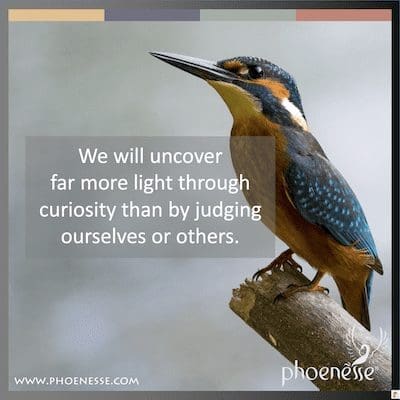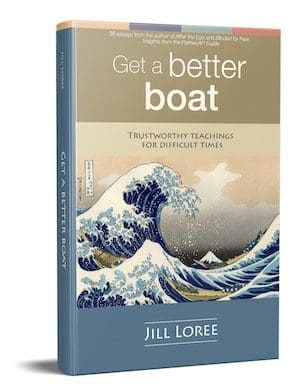
We will uncover far more light through curiosity than by judging ourselves or others.
If we simmered all the teachings from the Pathwork Guide for a year, reducing and reducing and reducing them, they would all boil down to this: self-responsibility. Yet this notion that something in us is at the heart of all our disturbances can easily go sideways.
One problem lies with the issue of awareness. We’re simply not aware of what we’re not aware of. And as long as we lack awareness of the origin of our conflicts in life, we can’t see how we could possibly be responsible for them. Here lies the crux of the challenge of being human.
In her excellent book Left Neglected, neuroscientist Lisa Genova tells a story about Sarah, a woman in her 30’s who suffers a brain injury. What’s fascinating is that the injury steals the woman’s awareness of everything on her left side. So she must retrain her mind to perceive the world as a whole.
At one point in the story, her husband is visiting her in the hospital. She asks him to tell her everything he sees in the room. He names the bed, sink, chair, door, window. Then she asks him to say what’s on the other side of the room, the side he can’t see. He’s confused. There isn’t another side. But that’s her experience now. She has no awareness of one side of life, which is everything on the left.
You could say our unconscious is, in effect, everything on the left. It’s the part of life we can’t see. As such, we don’t even know where to turn to start looking for it. Most people are unaware it even exists.
Pitfalls to realizing we’re responsible
When we start to catch on that we, ourselves, are responsible, we’re at a major milestone. Yet it’s possible to misunderstand this as well. First, many think the idea of self-responsibility eliminates God. So either there is a God and that’s who directs our lives, and if suffering is involved we just have to take it on the chin. Or we turn to atheism and believe there is no God.
But this is a false choice. In truth, we will only find self-responsibility to be a burden if we feel guilty every time we uncover an inner error. But once we get past this by accepting ourselves as we are right now—without getting angry or rebellious, or feeling the wrong kind of shame or guilt—then self-responsibility will become a doorway to freedom.
Many think the idea of self-responsibility eliminates God.
There’s no false security in the world that can match the true strength we gain from seeing what’s caused our discontent, our worries, our unhappiness, and our problems. It doesn’t matter what kind of false security we’ve tried: relationships with others, concepts, distorted ideas about God. True strength and freedom start arriving the moment we start understanding our own causes and their effects.
Yet as crucial as self-responsibility is for our development, most of us want to avoid it in some way. Even though we also revolt against having our freedom curtailed! The only way to resolve this conflict is to find out how and why we have limited our own freedom. How have we given up self-responsibility in order to opt for an easier way to go through life?
Although it looks different for everyone—since we’re made up of differing qualities, faults and currents—pretty much everyone has a desire to escape self-responsibility. And the more we run from it, the more shackled we become. Then we strain against the chains, kicking and screaming at the world, and feeling it is all so unjust. We’ll even wallow in self-pity, while we stop doing the very thing that breaks the chains: take on self-responsibility.
Steps to freedom
The key to becoming free lies in self-responsibility. First, we must find out: a) “Where am I causing myself suffering?” And then b) “How is it in my power to change this?”
Second, we must find out about our fear of getting hurt. We must come to see how this fear is what causes all our misery. Our excessive fear makes us act like a person who is so afraid of death they commit suicide. That’s basically what our images are doing. We’re so afraid of being hurt that we create these rigid forms in our soul. These forms, and the defenses they launch, bring far more needless hurt to us than would happen without them.
The reason we must accept hurt is not because God is giving it to us. It’s because we have given it to ourselves. And that doesn’t mean we should now revolt against ourselves or the wise divine laws that structure life this way. What we need to accept is that we are imperfect, and depending on the extent of our imperfections, we will suffer. And the more we are willing to work towards purifying ourselves, the less suffering we will experience.
It’s by going down, into the depths of our soul, that we rise up.
There are many requirements for doing this self-healing work, and one of them is to not expect miracles overnight. We can learn a lot by meeting our pain, and by accepting it for as long as we’re in this stage of our development. The more we can relax into the process of finding and eliminating the causes inside of us, the faster we’ll get over these obstacles.
Going about the process in a slow and persistent way will help us have the right attitude about pain. Once we accept pain—which we can do in a healthy way, and not by struggling against it or by masochistically making more of it than necessary—then pain will finally cease. Because when we accept pain, we go through it, and it dissolves. And it’s only by going through something that we can reach beyond it. It’s by going down, into the depths of our soul, that we rise up.
Self-responsibility is not self-judgment
Back to self-responsibility, the only way to truly unwind our difficulties in life is to look for where they truly originate. And always, that place is inside us. The way forward then is to unwind our hidden untruth and release the old unfelt pain associated with it. This is what we’ve been running from for eons. It’s time we start to see the whole truth.
But this is exactly where things become tricky. For the moment we catch on that we are responsible for our troubles, we turn on ourselves and start to judge ourselves as being bad or wrong. After all, we’re compelled by the illusion of duality to split everything into good or bad, right or wrong.
Yet as the Pathwork Guide teaches, the unconscious does not respond well to a moralizing attitude. So if we’re hoping to give up the untruthful secrets behind our struggles, we’ll need to find another approach.
What’s a better approach?
The best way to move ahead is to become curious. What could I possibly be hiding that I have not been willing to see? We must see where we have been in distortion, where we have acted from our faults, and then correct our course. We must allow ourselves to feel remorse for any pain we have caused by what we have done, or not done, due to error.
But as we step into self-responsibility, we must not slip into moralizing guilt or shame. For we will uncover far more light through curiosity than by judging ourselves or others.
“True remorse has nothing to do with either guilt or shame. With remorse, we are simply recognizing where we fall short. These are our faults and impurities, our shortcomings and limitations. We’re admitting that there are parts of us that violate spiritual law. We feel regret and are willing to admit the truth about our destructiveness. We recognize that it’s a useless waste of energy and hurts others and ourselves. And we sincerely want to change.”
–Pearls, Chapter 17: Discovering the Key to Letting Go & Letting God
Truth is a solid foundation
If we build our house on sand, it might last for awhile. But eventually things will start to crumble and collapse. We may even have forgotten we decided long ago to build on sand. But that doesn’t change the reality of the situation.
In the end, anything not built on a solid foundation of truth will eventually collapse. It must. So it can be rebuilt the right way.
The era that’s now arriving is going to further shake whatever is not sound, whatever has been built on sand. We must collectively come to realize that the only way to get to the other side of our challenges is by stepping through the doorway of self-responsibility. And that’s exactly what the Pathwork Guide is showing us how to do.
– Jill Loree

We can heal | AFTER THE EGO • BLINDED BY FEAR:
The Real. Clear. series | HOLY MOLY • FINDING GOLD • BIBLE ME THIS • THE PULL • PEARLS • GEMS • BONES
The Self. Care. series | SPILLING THE SCRIPT • HEALING THE HURT • DOING THE WORK
More spiritual books | WALKER • LIVING LIGHT • KEYS • SPIRITUAL LAWS • WORD FOR WORD


